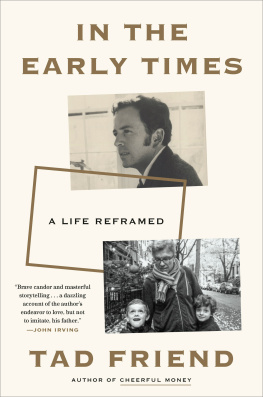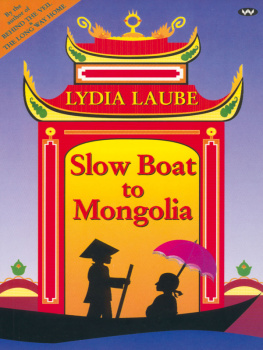
TAD FRIEND
LOST IN MONGOLIA
TRAVELS IN HOLLYWOOD
AND OTHER FOREIGN LANDS

NEW YORK
Copyright 2001 by Tad Friend
All rights reserved under International andPan-American Copyright Conventions. Published in the United Statesby AtRandom.com Books, a division of Random House, Inc., New York,and simultaneously in Canada by Random House of Canada Limited,Toronto.
ATRANDOM.COMBOOKS and colophon are trademarks of RandomHouse, Inc.
The articles and essays in this book have beenpreviously published in slightly different form in the followingperiodicals: Esquire, GQ, Harpers, The New Republic, NewYork, The New Yorker, Outside, Spin, and Vogue.
Library of Congress Cataloging-in-PublicationData
Friend, Tad.
Lost in Mongolia: travels in Hollywood and otherforeign lands/Tad Friend.
p. cm.
I. Title.
AC8.F6968 2001
070.4'44dc21 00-066489
Website address: www.atrandom.com
Cover design: Daniel Rembert
Cover illustration: KerenSu/Corbis
eISBN: 978-0-679-64705-8
v3.0
FOR MY PARENTS
Contents
Introduction
The creation of this, my first book, was so easy andenjoyable that Id like to share the process. Boy, was Ilucky! First, I spent a dozen years writing for magazines on topicscompletely unrelated to one another and totally unsuited forexpansion into a book. I forget why I did this.
Next, I was sitting at home in my bathrobe minding myown business when an editor at Random House called. He indicated,rather disapprovingly, that the companys shareholders hadvoted to have some of my better pieces gathered into a book.Apparently the idea met with favor because it would have no effectwhatsoever on the corporations balance sheet, particularlyas I was to be paid in brightly colored beads and chocolatecoins.
Which articles to choose? I started reading througheverything, beginning with the first article I ever wrote(Scholastic magazine: Dont Run withScissors!). Pretty soon I had to go lie down. When I wasable to take solid food and read on, I was pleased to see that thetone of reflexive sarcasm that stamped my earlier writings gaveway, gradually, to a more assured and becoming tone of jokeysmugness. Yet I noticed with dismay that throughout my career Ihave used a vocabulary of only about sixty words, placing anespecially heavy reliance on rueful,peppery, and frog-marched. Often thosewords were combined to striking effect. The sentence Therueful, peppery fox frog-marched over the lazy dog appearedat least five times, twice in the same short article aboutpresidential tracking polls.
I set aside the few pieces that seemed relativelydisaster-free. With an old bottle of Wite-Out in handjustone of the technological marvels made possible by electronicpublishingI then blotted out the lapses that my editorsshould have saved me from years ago. (Most editors are notorioushopheads and dope fiends.)
Thereupon I divided the redacted pile into threesmaller piles, each constituting a thematic section of the book.Collections must be divided into thematic sections, and mine are nolamer than anyone elses. Each section is also, I am proud toreport, entirely chronological. The first part I callHollywood, because it is about Hollywood. I go outthere from New York every few months to look around. For years Iwas careful to avoid being pigeonholed as an entertainmentwriter, but everyone believes that he is careful and yet thehospitals are full of babies.
The second part is America and ItsDiscontents. I have written a number of reported essaysabout American culture because I love it, and hate it, and want itto get better, and know that it wont, and cant resisttrying to coax it along.
Far from Home, comprising some of thepieces Ive reported from abroad, concludes the book. I usedto travel a lot, and have been to all seven continents, more thanfifty countries, and forty-nine states. I have also visited five ofour solar systems nine planets.
At last, when I had made my body of work lookcoherent enough to fool the untrained eye, I took a taxi to RandomHouse, fought my way past the security guards, and handed in thebook. The editors glanced up briefly from their hookahs and jugs ofRipple and slurred out, Wanshin. Nobyreeboo,bwayluffsgunshin. This I took to meanWrite an introduction. Nobody reads books, but everyoneloves a good introduction.
After the deadline was well past, I did, reluctantly,sit down to write this brief introduction. I resist writing. Iresist it for the very good reason that it makes me pace and sighand gaze despairingly at myself in the mirror. I find writing sopainful that my girlfriend is amazed that I am a writer at all. Awriter herself, she sings a little song at her computer as herhands fly over the keys: La la la, look at me go, I amwriting and also singing. Whee! I love her very much, mostof the time.
I havent told you much about why I became awriter, or why I never became an expert on one particular topic,preferring to roam the aisles of the world like a binge eater atthe Piggly-Wiggly. My belief is that youll find the answersto those questions by reading the articles themselves. Is that somuch to ask? No, I think, is the only possible response. At least,that is the only response I ever hear from readers: No no; no,thank you; no. Later, perhaps, but not just now.
Enjoy.
PART I
HOLLYWOOD
SITCOMS, SERIOUSLY
A Brady Bunch dream the other night. I was aBrady kid, in the sunken living room with Greg, Marcia, Peter, Jan,Bobby, and Cindy. We were fighting over the lead in the schoolplay, or who could drive the carsomething, anywaywhenMike Brady lolloped in. Our father wore bell-bottoms and a totallyboss Qiana shirt and was grooving to a Walkman. Scatteredlaugh-track chuckles, perhaps at the anachronistic personal stereo.We all shouted, Hey, Dad, weve got a problem!Mike bopped on.
KIDS: Hey, Dad!
MIKE: What?
KIDS: You cant hear us.Youve got a Walkman on!
MIKE: What?
KIDS: You cant hear us.Youve got a Walkman on!
MIKE: Im sorry, kids, Icant hear youIve got a Walkman on!
The laugh track roared, and I awoke, lunging out ofthe sheets. Its spooky to have a Brady dream, particularlyone with a laugh track. Spookier still to have my sleep troubled bylame sitcom dialogue. Werent there some deep-seatedchildhood conflicts to work out?
Since then Ive come to realize that the Bradydream did express a childhood conflict. This was clarifiedfor me one recent evening when I sat on the beach with a dozenfriends, enjoying the stars, the salty tang of the incoming tide,the moon glowing over the white carpet of water. Inspired, we tookturns naming Brady Bunch episodes and recalled 107 beforesomeone was stumped. They only made 116.
By my own estimate I have spent eleven thousand hoursof my life, many of them the golden afternoons of youth, watchingtelevision sitcoms. They were often idiotic; I loved them anyway.Nowadays, as more or less a grown-up, I view sitcoms with a mixtureof irony, nauseamany of them really do suckand,still, deep affection. So, Im conflicted.
Something new has happened to the generations bornsince The Goldbergs, the first sitcom, aired on CBSforty-four years ago. Those of us under forty-five grew up whelmedin sitcoms as minnows are whelmed in the sea, in thrall to a newmass art form, a transcontinental, transsocietal in-joke thatreaches up to thirty million people every half hour. We are cradledin sitcoms, rocked in their warm lap, nursed from what HarlanEllison calls the glass teat.
Next page









